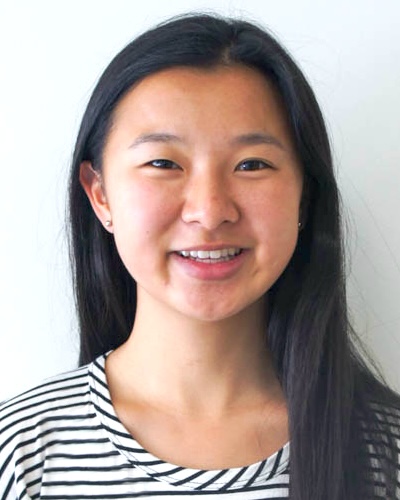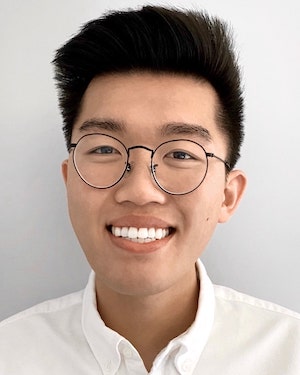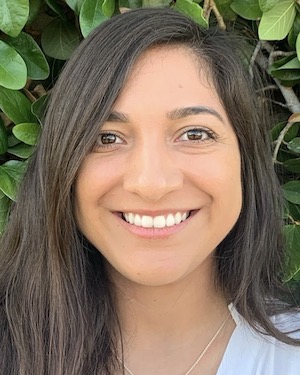Student Blog

The A-Z’s of USC OT: Part I ⟩
February 24, 2021, by Bethany
Admissions Diversity Externships Getting Involved International
As a Bachelor’s-to-Master’s student, I have been a part of the USC OT community for nearly five years. While learning to call this school home, I have realized that I am so lucky to be where I am. I’ve decided to compile an A-Z list of USC OT attributes that drew me to the program and that I learned as a part of the Trojan Family.
Area — USC is located in the wonderful California city of Los Angeles. Not only can you find a lot of OT volunteer opportunities nearby if you want to check out OT, but you can also drive to the beach, hike to the Hollywood sign, or check out amazing eateries.
Beyond classes — Outside of classes, there are a multitude of student organizations and groups that allow students to encourage growth within the school and also growth in the community we serve.
Creativity — Creativity is so integral to occupational therapy that we have an entire Foundations course on creativity. Not only do we look at crafts occupations, but we use creativity to find new ways to approach and solve problems with engaging in these occupations.
Diversity — Our division places a high value on representation from people of all different backgrounds. Whether it be looking at ethic diversity in admissions, gender representation in OT, or even diversity in ages and stages of life, our students and faculty are open to difficult and perspective-building discussions.
Early Level II — Some OT schools have classwork first and both Level II Fieldwork placements after. But we have our first placement the summer in between academic years, getting to bring our fieldwork experience into our final year of classes to build on that new understanding.
Finances — Funding school can be a difficult discussion. The division offers their own scholarships and financial aid resources. In addition, USC has resources for their students and scholarships through the university itself and other organizations.
Global — Students can expand their global perspective by planning an externship abroad. Or we can increase our understanding of OT around the world through our very own Global Initiatives program!
Hands-on — Whether in labs or in fieldwork or even in practice activities in lectures, I have been grateful for learning-by-doing opportunities. Now in fieldwork, I can see how small activities that we may have done in class can be used with my clients.
Interdisciplinary — We study how OT fits with other health professions, such as PT and social work. Students can also take advantage of other incredible programs at USC by taking electives in other schools, such as the Davis School of Gerontology, the Marshall School of Business, or the Rossier School of Education.
Jobs — There are good job prospects in OT, as it is a quickly growing field. You can also pick up a student worker position while in school, like my job as a student ambassador.
Knowledgeable professors — Our professors are open to talking about coursework and the OT field outside the classroom. They work with us to make sure that we can get a full experience, working with different accommodations needed and through different life circumstances.
Lifestyle Redesign — Lifestyle Redesign was created at USC. Students can both learn about a unique framework and experience it, too. Our faculty practice offers services to students who can experience Lifestyle Redesign and its impact on their lives and occupations as students.
Mental health — This is an area of OT that is not often given enough space, but here, it has its own immersion. After this class, I was more open to the idea of mental health and how occupational therapists can impact mental health and therefore performance in occupations.
New perspectives — In our classes, we discuss how different people would approach different cases and how our various perspectives can be expanded through others’ experiences. We learn from each other to expand our own creative thinking.
Stay tuned for Part II. 😊
⋯

Why I Chose to Attend USC ⟩
February 17, 2021, by Savi
Admissions Classes Fieldwork Getting Involved Living in LA
During the past few weeks, a plethora of admitted and prospective students have reached out to get a student’s perspective on why we chose to complete our Master’s degree at USC. This simple question has made me reflect on all the wonderful reasons I have enjoyed my time in the program. I have decided to create a list of the reasons I chose to complete my Master’s degree at USC below. I hope this list helps admitted students reading with your decision during this overwhelming and exciting time! This list can also be a great resource for students deciding whether or not to apply to this program in the coming years.
- The USC community and connections: Going to USC immediately connects you to a very large group of OTs around the world. With around 130 OT students graduating from the Master’s program each year, the quantity of USC OT alumni is exuberant. This allows current USC students the opportunity to have resources and connections both within and outside the division. Whether you are looking to find a job after graduating or get advice about your career path, you have an extremely high chance of finding USC alumni in your field of choice. This can be really helpful since OTs can work in such a wide range of practice settings and it can get tricky deciding what path may be right for you. During your various fieldwork placements, you are also bound to run into or be mentored by USC alumni and it is great to make those connections with other trojans who understand the curriculum, program structure, etc.
- The faculty and resources: As a student, you get the opportunity to learn from some of the most amazing and world-renowned OTs. All of the faculty members have dedicated their lives to OT through clinical work, teaching, and research. These clinicians, researchers, and educators all have an open door policy and capitalize on any opportunity to chat with and get to know students. You can go to them for casual conversation, assistance with schoolwork, guidance in life and your career, and more. This team, along with all of the outstanding cutting-edge research being conducted within our division, gives us the unique opportunity to be some of the first to learn about the most up-and-coming techniques and discoveries. This environment encourages every student to challenge themselves, work hard, and become a leader in the OT field.
- The students: As mentioned before, USC admits around 130 students into their Master’s program. This larger class size has given me the opportunity to meet a plethora of different learners and future practitioners. After spending the first summer semester learning from all of these different perspectives in a larger class setting, everyone is split up into three different cohorts of about 40-50 students. The cohorts are small so you get to know everyone really well, but you also get the chance to socialize with the larger group of around 130 students outside of the classroom to learn about their experience in different practice immersions before you take them. The cohorts are further split into 2 groups to make lectures and labs even smaller. The two groups will switch off the order in which they attend lectures and labs, which allows for more individualized attention from the professors during class.
- Hands-on work: USC integrates fieldwork into each semester. As an extremely hands-on learner, I was really excited to discover that USC allows students to work at a fieldwork I site once a week during each practice immersion semester. We, therefore, get the chance to go into class three times a week and then apply what we learn in real-time with clients. We can come back each week and debrief with each other and our professors. By doing so, I didn’t feel like I was just a student sitting in class trying to absorb information. I really got the chance to take that knowledge and apply it every week. On top of that, we also are provided with the typical fieldwork II experience, in which we work as full-time OTs for 12-weeks during each summer in a setting of your choice. We have connections with over 950 fieldwork sites across the globe, so the opportunities to work in any field of your choice before graduating are endless. Students also have access to Keck Hospital of USC and USC Norris Cancer Hospital Occupational Therapy and the Faculty Practice, which is the birthplace of Lifestyle Redesign®. Students, therefore, have the opportunity to be mentored in a number of existing and developing practice areas at the outstanding USC hospitals and at the Faculty Practice in order to gain clinical experiences during their program of study.
- Los Angeles: Los Angeles is a city with endless OT opportunities. Whatever you may be passionate about in the OT realm . . . you can find it in LA. Outside of OT opportunities, LA is an amazing place to live. Anything you want to do, see, or eat is in this city. You can go hiking in the morning, sit on the beach in the afternoon, and grab a bite to eat in downtown all in one day! Comedy shows, outdoor adventures, etc. It is ALL here.
⋯

Dear Waitlist Applicants, ⟩
February 15, 2021, by Calvin
How are you? I wanted to check in with you all to see how you’re doing. I know that being placed on the waitlist was probably not the ideal situation you were hoping to be in, but I want to commend you for making it this far. You’ve accomplished so much, from completing the entire application process to your experiences leading up to this moment. Congratulations and thank you for taking the time to apply to USC Chan, as well as for your dedication towards pursuing a career in occupational therapy.
I know that the waitlist entails a lot of uncertainty and that it’s not necessarily a yes or a no. However, although it is a very gray area, there is still a chance for you to be admitted off of the waitlist! Quite a number of my classmates were actually admitted off of the waitlist. The thing is that there’s the wait. The wait varies between each applicant and each application cycle. Along with other factors, it also depends on how much space is available to fill the incoming class. That’s the catch with the waitlist though — it’s very unpredictable and really, anything can happen at any time.
Some of you may have applied to USC Chan as your only option and others of you may have offers from other programs. I’ve been in very similar situations and can imagine that you might be feeling frustrated, disappointed, or even heartbroken. When I first applied, I was rejected with no option to be part of the waitlist. It was a devastating moment, but it gave me the opportunity to take a gap year and reapply the following year. I felt that it was a chance for me to show how much I grew from that experience and how ready I was to take on this new journey. Then, after reapplying, I was placed on the waitlist. Except this time I had other schools waiting to hear back from me about their offers, and I was just so conflicted. “Should I accept the offer from this other school, or should I keep waiting?” I decided to wait all the way until the start date of the program, and I’m very grateful that it ended up working out for me. However, it was incredibly difficult for me to wait that long, and I know that not everyone can afford that amount of time.
What I’m really trying to say is, I want to be real with you all because I’ve been through it and waitlist candidates hold a very special place in my heart. There may be a lot going through your mind right now, but know that your thoughts and feelings are valid. Know that you are all strong applicants and that you do have the potential to be amazing OTs. Although there is no guarantee that you will get off the waitlist, we are here for you and want to support you through this process. Please feel free to get in touch at .(JavaScript must be enabled to view this email address) and we would be more than happy to connect with you. Take good care!
⋯

My Fieldwork in a “non-traditional” setting ⟩
February 12, 2021, by Lamoni
My previous blog post was about being comfortable with uncertainty as I waited to learn where I would be placed for fieldwork this semester. Update: I have been placed and I have completed my first week! I am in what we would call a “non-traditional” setting. The work that I will be doing is not happening in a clinic or hospital and the clients do not have diagnoses. In fact, I will be completing my work remotely because it is research. I am at SOLA Peace Center working under Dr. Kristy Payne and regularly meeting with Dr. Gelya Frank. SOLA is a non-profit organization that has recently formed a collaboration with USC. SOLA’s primary goal is to create more peaceful and just communities. It is based out of South Los Angeles and primarily serves the economically disadvantaged. The organization recognizes that poverty is a form of structural violence and due to a lack of resources, children in these communities are often experiencing occupational alienation. As occupational therapists, we know the many benefits that occupation and occupational opportunities bring to our lives. Thus, we can imagine how detrimental the lack of occupational opportunities can be. Without proper tools, skills, and resources, children are limited in their possibilities. My role as a level II fieldwork student here is to strengthen the effectiveness and reach of SOLA in the community by attending community meetings, completing observations, and researching best practices. To be productive in the community, SOLA must be backed by evidence.
Though I am not writing treatment plans and submitting documentation, the work at SOLA is that of an occupational therapist. I ask the questions, “what is preventing children in this community from engaging in meaningful occupation?” and “How can I change that and help them be successful?” The overarching theme of occupational therapy remains – how can I help this person do what they need to do and want to do (despite disability, illness, and/or circumstance)? The work at SOLA is a combination of pediatrics, wellness, and mental health. Children learn ways to regulate themselves, life skills such as peaceful communication and conflict resolution, and goal-setting for self-improvement. Further, children learn how to be leaders in their community, how to take social action, and how to make their voices heard. There is no selection process—anyone that wants to join is able to do so. What I love most about SOLA is their focus on and integration of occupational justice. SOLA aims to give children exposure to new possibilities and the tools that they need for success in school, in the workforce, and in society. The mission is to help those in the community feel like they have agency, particularly the children that are often overlooked.
I am so excited to acquire and develop new skills while working with SOLA Peace Center! The insight that I gain will not only help me become a more thoughtful, well-rounded occupational therapy practitioner, I will be assisting in leveling an unfair playing field while doing so. Everything that we do with intention is occupation. That means that occupational therapy fits into much more than the distinct areas of adult rehabilitation, pediatrics, and mental health. We are a profession with so much value and so much to share. Let us continue to expand and bring our expertise where it is needed.
⋯

Imposter Syndrome: Undergrad Edition ⟩
February 10, 2021, by Liz
As I’ve mentioned before, one of the best parts of being a student ambassador is connecting with students—students that have been recently admitted, students interested in applying, and current students. Last night I had a video call with a recently admitted student, and they asked me something that really stood out to me. She asked me about imposter syndrome, but it wasn’t about how I related to it as a person of color. It was about how I felt when I was first admitted coming from Cal State Fullerton. Now, this person did not mean to make Cal State Fullerton sound inferior to other campuses and I certainly have nothing negative to say about CSUF at all. But, I thought it was a great question.
I remember being very proud and excited when I first received my acceptance letter to the program. But, as summer slowly approached, I started to worry about whether or not I would be just as “smart” or just as “prepared” as all of the other students in my class. I didn’t mean to doubt myself or feel as though I was competing with everyone else, but I just wanted to be good enough and feel like I deserved to be there.
On the first day of class, we all introduced ourselves. The faculty put together a PowerPoint that stated what our names were, our hometown, and the universities we attended. My last name begins with an R so you can only imagine how nervous I felt as they went through everyone leading up to my turn. As people walked up to introduce themselves, I saw UCLA, UC Berkley, San Diego State, UC Davis, USC, Chapman—all of these highly respected universities on people’s slides. And again, I don’t mean to say CSUF is any less than these institutions, but the schools on those slides definitely come with a reputation of being some of the best. It took some time for me to feel confident and know that I was just as good a student as everyone who came from these other highly respected schools. I have to say that everyone in my classes has had amazing ideas and thoughts to share these past two years—people from divrse backgrounds who’ve attended different universities.
That’s the point I hope to get across with this post. It’s completely normal to feel nervous and scared that you may not be as good as everyone else around you in class. I’m sure everyone that gets admitted feels this in some way! But, I want you to know that you deserve to be here and there’s a reason you were admitted and it’s because the admissions team saw something in you that made them believe you would be a great OT. That’s the great thing about the holistic admissions process. There’s bright people on every campus and we want people with different backgrounds to share their experiences in the classroom. I also thought this was something that students who are currently at community colleges could relate to as well. Continue to push yourself and work towards getting that bachelor’s degree in order to one day apply for OT school!
At the end of the day, we’re all working towards being occupational therapists. You’ll get a chance to develop your clinical reasoning skills and discover your therapeutic use of self along the rest of your peers. We’re all on this journey together. So, congratulations to all those students who just recently got admitted into our program. Take some time to celebrate all of the hard work you did to get here. And if you’re still preparing to apply or try again, you also got this! As always, feel free to shoot me an email if you would like to chat more about this or anything at all. Fight on!
⋯





